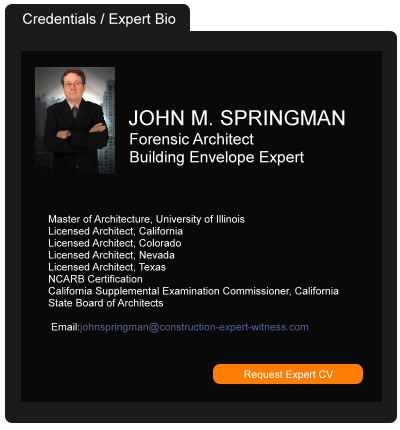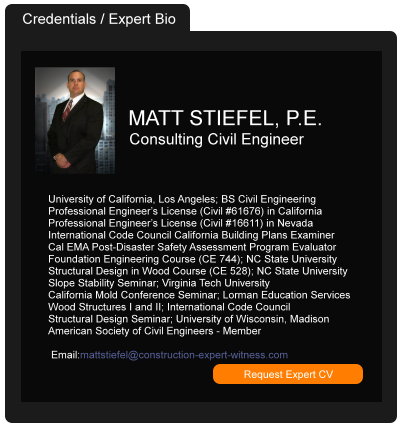Courthouse Reporter Series: The Travails of Statutory Construction...Defining “Labor” under the Miller Act
August 01, 2023 —
Brendan J. Witry - The Dispute ResolverIn a recent case—United States ex rel. Dickson v. Fidelity & Deposit Co. of Maryland (“Dickson”)—the U.S. Court of Appeals for the Fourth Circuit recently re-examined and defined what work qualifies as “labor” under the Miller Act.
United States ex rel. Dickson v. Fidelity & Deposit Co. of Maryland, No. 21-160, 67 F.4th 182 (4th Cir. April 26, 2023) (slip op.).
Unlike private projects, unpaid subcontractors cannot encumber the federal government’s property with mechanics liens. Instead, the Miller Act provides a remedy for subcontractors in the form of a payment bond on all federal public works contracts exceeding $100,000. 40 U.S.C. § 3131(b).
In the Dickson case, Claimant Elliot Dickson served as a subcontractor to Forney Enterprises (“Forney”), with whom the Department of Defense (the “DOD”) contracted to renovate several staircases and the fire suppression systems at the Pentagon.
Read the court decisionRead the full story...Reprinted courtesy of
Brendan J. Witry, Conway & Mrowiec Attorneys LLLPMr. Witry may be contacted at
bjw@cmcontractors.com
Apartment Projects Fuel 13% Jump in U.S. Housing Starts
May 19, 2014 —
Michelle Jamrisko and Hui-yong Yu – BloombergA surge in construction of multifamily dwellings in April propelled U.S. housing starts to the highest level in five months, helping overcome slack demand for single-family homes.
Housing starts climbed 13.2 percent to a 1.07 million annualized rate following March’s 947,000 pace, according to figures released today by the Commerce Department in Washington. Another report showed a measure of consumer confidence unexpectedly declined from a nine-month high.
An almost 40 percent increase in construction starts on projects such as condominiums and apartment buildings accounted for almost all of the April gain, as single-family activity was held back by declining affordability. The report highlights a shift in demand for housing in the wake of the financial crisis, which left many Americans wary of taking on new debts.
Michelle Jamrisko may be contacted at mjamrisko@bloomberg.net; Hui-yong Yu may be contacted at hyu@bloomberg.net
Read the court decisionRead the full story...Reprinted courtesy of
Michelle Jamrisko and Hui-yong Yu, Bloomberg
DC Circuit Upholds EPA’s Latest RCRA Recycling Rule
September 23, 2019 —
Anthony B. Cavender - Gravel2GavelOn July 2, 2019, the U.S. Court of Appeals for the District of Columbia Circuit decided the case of California Communities Against Toxics, et al. v. EPA. In this decision, the court rejected the latest petition to strike or vacate EPA’s 2018 revisions to the Resource Conservation and Recovery Act (RCRA) hazardous waste recycling rules. In 1985, EPA promulgated a new regulatory definition of “solid waste,” which is the linchpin of the agency’s very stringent hazardous waste management rules. (See the rules located at 40 CFR Sections 260-268.) Unless a material is a “solid waste” as defined by the rules, it cannot also be a hazardous waste.
The 1985 rules grappled with the challenges posed by recycling practices, and attempted to distinguish between legitimate recycling which is not subject to hazardous waste regulation, and other more suspect forms of recycling. The rules are complex and replete with nuance. In doing so, EPA was adhering to RCRA’s statutory mandate that it develop appropriate rules to govern the treatment, storage and disposal of hazardous waste, while also promoting “properly conducted recycling and reuse.” The DC Circuit reviewed the 1985 rules in the seminal case of American Mining Congress v EPA, 824 F.2d 1177 (1987), (AMC) and stressed that only those materials that were truly discarded could be regulated as solid waste; for instance, those materials that were destined for immediate recycling or recovery in an ongoing production process were not discarded and hence were not solid waste. Over the years, the court has struggled to clarify the basic holding of AMC in numerous cases while EPA has frequently revised and amended the RCRA rules, and in particular the definition of solid waste, in an attempt to balance the policies mandated by the statute.
Read the court decisionRead the full story...Reprinted courtesy of
Anthony B. Cavender, PillsburyMr. Cavender may be contacted at
anthony.cavender@pillsburylaw.com
Nine Haight Attorneys Selected for Best Lawyers®: Ones to Watch 2021
September 14, 2020 —
Haight Brown & Bonesteel LLPNine Haight Brown & Bonesteel LLP attorneys were selected for Best Lawyers®: Ones to Watch 2021. Congratulations to
Courtney Arbucci,
Frances Brower,
James de los Reyes,
Kyle DiNicola,
Arezoo Jamshidi,
Kristian Moriarty,
Beth Obra-White,
Casey Otis and
Kaitlin Preston!
Since it was first published in 1983, Best Lawyers® has become universally regarded as the definitive guide to legal excellence. Best Lawyers lists are compiled based on an exhaustive peer-review evaluation. Almost 94,000 industry leading lawyers are eligible to vote (from around the world), and Best Lawyers has received over 11 million evaluations on the legal abilities of other lawyers based on their specific practice areas around the world. Lawyers are not required or allowed to pay a fee to be listed; therefore inclusion in Best Lawyers is considered a singular honor. Corporate Counsel magazine has called Best Lawyers “the most respected referral list of attorneys in practice.”
Read the court decisionRead the full story...Reprinted courtesy of
Haight Brown & Bonesteel LLP
Yet Another Reminder that Tort and Contract Don’t Mix
January 25, 2021 —
Christopher G. Hill - Construction Law MusingsI have stated on numerous occasions here at Musings that in Virginia, contract claims and tort claims (read fraud) don’t mix. A recent case from the Federal District Court for the Eastern District of Virginia presents another example of this principle. In Itility LLC v. The Staffing Resource Group, Judge Ellis of the Alexandria Division, considered ITility’s claims of fraud and breach of contract against SRG and one of its officers based upon SRG’s alleged violation of its duties under a teaming agreement. The claim by ITility was that TSRG provided false and misleading resumes and thus damaged ITility. SRG filed a Motion to Dismiss and the Court was therefore required to resolve the following issues: (1) whether plaintiff’s fraud claim is barred by Virginia’s “source of duty” rule; (2) whether plaintiff’s claim for tortious interference with a business expectancy is barred by SRG’s participation in the business expectancy, and (3) whether the teaming agreement between the parties bars plaintiff’s claims for consequential and punitive damages.
Reprinted courtesy of
The Law Office of Christopher G. Hill
Mr. Hill may be contacted at chrisghill@constructionlawva.com
Read the full story... Read the court decisionRead the full story...Reprinted courtesy of
When Can Customers Sue for Delays?
September 18, 2023 —
Scott L. Baker - Los Angeles Litigation BlogConstruction projects are subject to many internal and external factors. Due to this, delays are not an uncommon occurrence. Whether delays are the result of bad weather conditions or supply chain issues, contractors and their clients cannot control every aspect of the project.
Delay issues are very
common construction disputes. Therefore, new and experienced contractors alike need to know when their clients may have a reason for a delay claim.
2 particular types of delays that pose a risk
Common obstacles that contractors faced during the height of the COVID-19 global pandemic involved supply chain issues. The lack of materials put various projects on hold across California and the country. This widespread issue was out of contractors’ and clients’ control, meaning they were excusable delays.
Read the court decisionRead the full story...Reprinted courtesy of
Scott L. Baker, Baker & AssociatesMr. Baker may be contacted at
slb@bakerslaw.com
Courts Will Not Rewrite Your Post-Loss Property Insurance Obligations
June 14, 2021 —
David Adelstein - Florida Construction Legal UpdatesIn the preceding
posting, I wrote about making sure you comply with your property insurance policy’s post-loss policy obligations. By failing to comply, you can render your policy ineffective meaning you are forfeiting otherwise valid insurance coverage, which was the situation discussed in the preceding posting. As an insured, you should never want this to occur!
In another case, discussed
here, the property insurance policy had a preferred contractor endorsement. This means that instead of paying the insured insurance proceeds, the insurer could perform the repairs with its preferred contractor. Typically, the insured will pay a discount on their premium for this preferred contractor endorsement. The insurer elected to move forward with the repairs based on the preferred contractor endorsement but the insured performed the repairs on his own and then sold the house. By doing this, the appellate court held the insured rendered his policy ineffective by breaching his own policy (and failing to allow this post-loss obligation to take place). The explicit terms of the policy allowed the insurer to perform the repairs instead of paying the insured insurance proceeds. The court could NOT rewrite the post-loss obligations in the policy by requiring the insurer to pay insurance proceeds when the insurer, per the preferred contractor endorsement, elected to perform the repairs.
Read the court decisionRead the full story...Reprinted courtesy of
David Adelstein, Kirwin Norris, P.A.Mr. Adelstein may be contacted at
dma@kirwinnorris.com
Mediating is Eye Opening
September 17, 2015 —
Christopher G. Hill – Construction Law MusingsAs anyone that reads this construction law blog on any sort of regular basis knows, I am a big advocate for mediation in most cases (construction or otherwise). I took this truly to heard about four years ago when I decided to go through the training and mentorship to become a certified mediator here in Virginia. This training led to many opportunities to act as a mediator in the General District Courts here in Virginia and has recently given me the great privilege of helping parties that were not court referred resolve their disputes.
I’ve discussed this first category of mediations at other times here at Musings, but it is the second category that has opened my eyes lately. The non-court referred mediations are those where the parties actively seek out the assistance of a mediator because they, like me, know that more often than not the control and ability to come to some form of negotiated solution (not to mention short circuiting the litigation process in a way that saves money) is a better way to go than to go through the expensive (though as a construction attorney I acknowledge sometimes necessary) process of litigation.
Read the court decisionRead the full story...Reprinted courtesy of
Christopher G. Hill, Law Office of Christopher G. Hill, PCMr. Hill may be contacted at
chrisghill@constructionlawva.com


































































